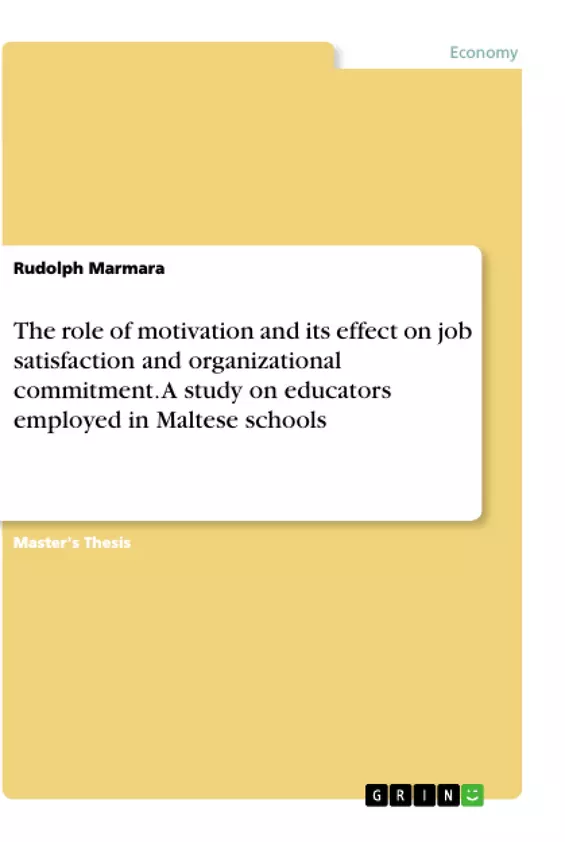This study was based on the philosophy of positivism which directed the author to use a deductive approach. A stratified random sampling technique was used to select a sample from each educators’ category out of a total population of 6745 educators. A total of 713 respondents (382 teachers, 65 kindergarten educators and 266 learning support educators) took part in the study. The data collecting tool used was a questionnaire with close-ended questions. SurveyMonkey and MS Excel built-in tools were used to analyse and present the quantitative data collected.
The Maltese Government has highly invested in its educational sector intending to achieve a better learning outcome rate and decrease the number of early school leavers. To reach its targets, the education expenditure rate in 2017 compared to Malta’s GDP was 4.9% which was above the EU average. Furthermore, in 2018, the budget for Education was even higher due to an increase in educators’ salaries. The Maltese educational sector, which is under the remit of the Ministry of Education and
Employment (MEDE), employs 9871 people which is a substantial share of the country’s public service workforce. Most of them are educators who are collectively responsible for the learning outcomes of students attending Maltese State schools (MSS). Apart from the administrative roles of College Principals, Head of Departments, Head of Schools, Assistant Heads of Schools and Education Officers, the Educators’ class is composed of three other categories which are the teachers in both primary and secondary schools, the kindergarten educators (KE’s) and the learning support educators (LSE’s). For this research study, any reference to the Educators class is referring to the categories of teachers, KE’s and LSE’s.
Inhaltsverzeichnis (Table of Contents)
- Acknowledgements
- Abstract
- Table of Contents
- List of Figures
- List of Tables
- List of Abbreviations
- Chapter 1: Introduction
- 1.1 Research Background
- 1.2 Aims and Objectives
- 1.3 Research questions
- 1.4 Hypotheses
- 1.5 Research Justification
- Chapter 2: Literature Review
- Introduction
- 2.1 Motivation
- 2.2.1 Educators Motivation
- 2.3 Job Satisfaction
- 2.4 Organisational Commitment
- 2.5 Theories of Motivation and Job Satisfaction
- 2.5.1 Needs-Hierarchy Theory
- 2.5.1.1 Variations and Criticism of the Needs-Hierarchy Theory
- 2.5.2 Two-Factor Theory
- 2.5.2.1 Criticism of the Two Factor Theory
- 2.5.1 Needs-Hierarchy Theory
- 2.6 Intrinsic and Extrinsic Motivation
- 2.6.1 Intrinsic Factors
- 2.6.2 Extrinsic Factors
- 2.7 Motivation Variances by Gender and Age
- 2.7.1 Gender
- 2.7.2 Age
- 2.8 Research Gap
- Chapter 3: Methodology
- 3.1 Introduction
- 3.2 Research Philosophy
- 3.3 Research Approach
- 3.3 Research Strategy
- 3.3.1 Research Methods and Justifications for Rejection and Selection
- 3.4 Data Sources
- 3.5 Research Design, Sampling and Data Collection
- 3.5.1 Questionnaire Structure
- 3.5.2 Testing of Data Collection Instrument
- 3.5.3 Sampling
- 3.5.4 Questionnaire Distribution
- 3.6 Ethical Considerations
- Chapter 4: Findings, Analysis and Conclusions
- 4.1 Introduction
- 4.2 Response Rate
- 4.3 Demographic Characteristics
- 4.3.1 Gender
- 4.3.2 Age
- 4.3.3 Educational Background
- 4.3.4 Grade
- 4.3.5 Length of Service
- 4.4 First Research Question
Zielsetzung und Themenschwerpunkte (Objectives and Key Themes)
This research investigates the levels of motivation, job satisfaction, and organisational commitment among educators employed in Maltese State Schools. The study aims to identify the factors that significantly impact educators' motivation and job satisfaction. Moreover, it examines the relationship between these variables and explores potential differences in motivation across age groups, genders, and educators' grades.
- Motivational levels of educators in Maltese state schools
- Factors influencing educators' motivation and job satisfaction
- Relationship between motivation, job satisfaction, and organisational commitment
- Influence of age, gender, and grade on educators' motivation
- Recommendations for enhancing motivation, job satisfaction, and organisational commitment
Zusammenfassung der Kapitel (Chapter Summaries)
Chapter 1 introduces the research topic by outlining the background, aims, objectives, research questions, hypotheses, and justification for the study. Chapter 2 provides a comprehensive literature review examining existing theories and research on motivation, job satisfaction, and organisational commitment. It delves into the concepts of intrinsic and extrinsic motivation, exploring how these factors influence educators' experiences. Additionally, the chapter examines potential variances in motivation based on gender and age. Chapter 3 outlines the research methodology, including the philosophy, approach, strategy, data sources, sampling techniques, data collection methods, and ethical considerations.
Schlüsselwörter (Keywords)
The research focuses on the themes of motivation, job satisfaction, and organisational commitment in the context of Maltese state school educators. Key concepts include intrinsic and extrinsic motivation, needs-hierarchy theory, two-factor theory, and the impact of demographic factors on motivation. The study also explores the relationship between motivation, job satisfaction, and organisational commitment, with implications for improving educator well-being and retention within the Maltese education system.
- Quote paper
- Rudolph Marmara (Author), 2019, The role of motivation and its effect on job satisfaction and organizational commitment. A study on educators employed in Maltese schools, Munich, GRIN Verlag, https://www.grin.com/document/938421



